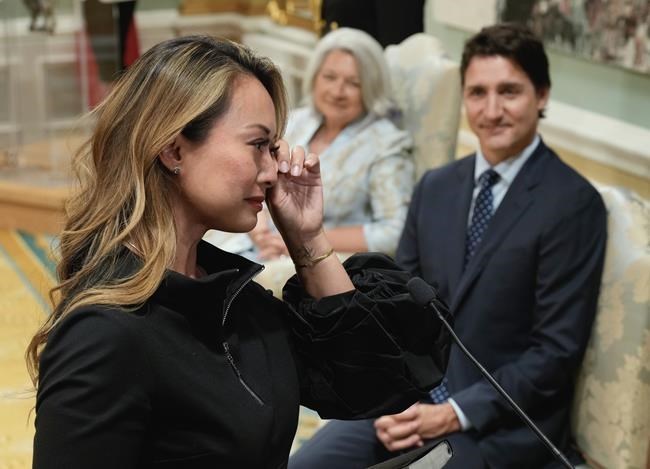TORONTO — Rechie Valdez, who made history this week when she became the first Filipino-Canadian woman named to the federal cabinet, took an unusual path to high political office, transitioning from banking to baking to Parliament.
Born in Zambia into a Filipino family that had immigrated to the southern African nation, Valdez, now 43, said the day her flight landed in Canada in December 1989 was the first time she ever put on a winter jacket.
"I grew up in shorts and T-shirt and then I came to this incredible country in the middle of winter," she told The Canadian Press in an interview.
Her promotion this week to serve as Prime Minister Justin Trudeau's minister of small business marked a breakthrough for Filipino-Canadians, a community that has raised concerns about what it calls its under-representation in government.
Valdez, who was first elected to represent Mississauga—Streetsville in 2021, struggled to hold back tears as she took the oath swearing her into cabinet on Wednesday, part of a broader Trudeau cabinet reshuffle.
"It's a very proud moment," she said, noting that her husband and two children were in the audience and that her family in Mississauga, Ont., was watching on television.
Valdez said Filipino-Canadians hadn't had a voice in federal politics since Winnipeg MP Rey Pagtakhan -- who in 1988 became the first Filipino-Canadian to become an MP -- was defeated in the 2004 election.
"It's all about representation and having a voice at the table," she said.
More than 957,000 Canadians identified themselves as having Filipino roots in the 2021 census, including more than 757,000 people who were born in the Philippines and immigrated to Canada, according to Statistics Canada.
Valdez said she worked in banking for 15 years but changed course in 2016, when she baked a cake for her daughter's first birthday.
"I became a self-taught baker. I started off baking. I told my friends, I'm like, 'Hey, so I make cupcakes now. Would you like to try?'" she said.
"Eventually, once I was able to master my recipes, I then registered my business and became an official small business entrepreneur."
As her business grew, she started serving customers across the Greater Toronto Area. Then she launched another business supplying a Filipino fusion line of pastries and desserts to Asian grocery store chains in Mississauga.
"I went from baking a single birthday cake to being able to stock grocery," she said.
"It was an incredible journey."
She has also hosted a show on Filipino TV which shared stories of entrepreneurs and artists. She worked with basketball associations and raised funds for children’s charities across Canada.
She said her resume has equipped her to advocate for small businesses.
"Being a small business entrepreneur in Canada, you learn what it takes to have a vision, to work hard at that vision and to grow your business from the ground up," she said.
Grant Gonzales, co-founder of the Filipino Canadian Political Association, called her appointment "inspiring."
"I personally was very proud. Teared up a little bit with Rechie herself was taking the oath because it was so emotional and it means so much to the Filipino-Canadian community."
Gonzales said there are systemic barriers in Canadian politics that make it difficult for racialized people, including the Filipino-Canadian community, to reach elected office.
"Racialized people often can't rely on intergenerational networks that have benefited others," he said.
"We're immigrants, we're first generation, we're second generation Canadians. We don't have those well-established networks that often are so critical to help propel people into elected office."
Gonzales, who ran for a city council seat in Toronto's municipal election last year, said people considering running for office have to consider making financial sacrifices and the personal toll taken by the increasing levels of toxicity in Canadian politics.
"That is making people across the board second guess entering (the race for) office," he said.
"There are so few elected Filipino leaders in Canada despite our rapidly growing population," he said.
Paul Saguil, a Filipino-Canadian lawyer who ran as the Liberal candidate in Willowdale in the Ontario provincial election last year, agreed that his community has faced hurdles in entering politics, including the fact that many Filipinos have begun their life in Canada without permanent residency status.
Saguil said Filipino representation in politics has been helped by the fact that parties increasingly see racialized Canadians as strong candidates.
Filipino-Canadians have been elected provincially in British Columbia and Manitoba and as municipal councillors in Alberta, British Columbia and Ontario.
But, he stressed, there is still a long way to go.
"Filipinos have been in Canada since almost before Confederation and it's tragic that we have never had representation at Queen's Park or at Toronto City Hall," he said.
"I think that needs to change."
This report by The Canadian Press was first published July 28, 2023.
Maan Alhmidi, The Canadian Press




